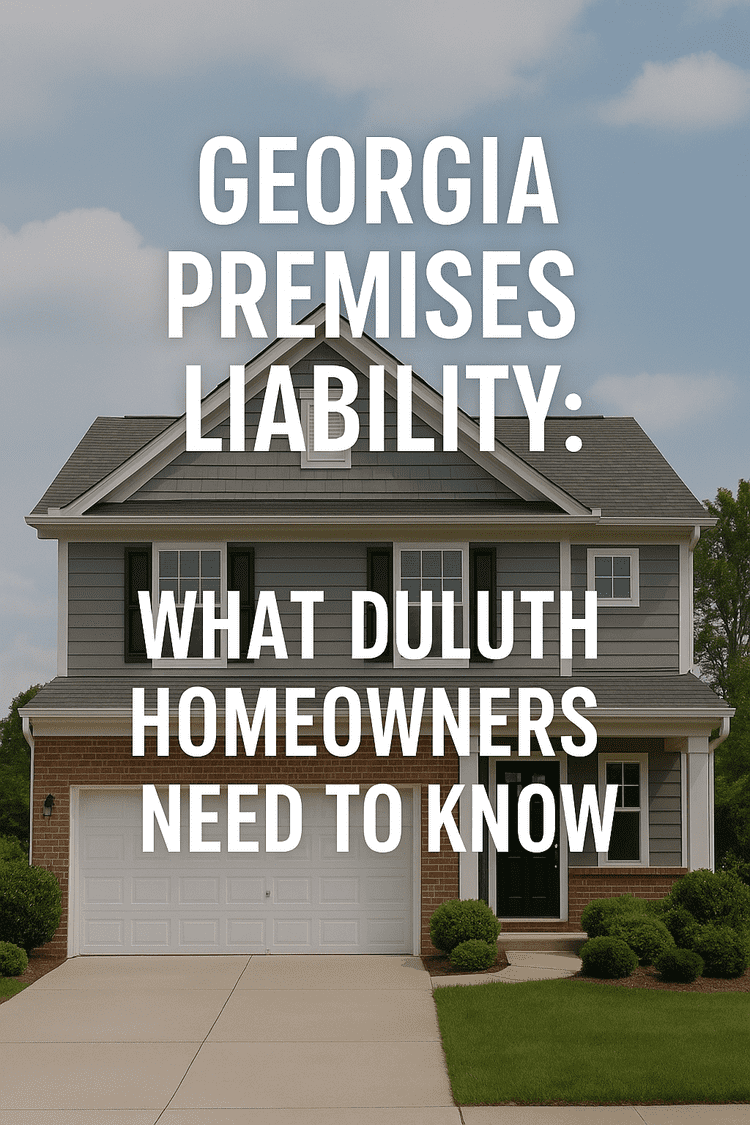
How Legally Protected Is Your Home?
What would happen if someone got hurt on your property in Duluth, Georgia?
Would your current insurance policy actually cover the legal consequences?
As a responsible homeowner, you deserve to know exactly where you stand—both legally and financially—before an accident happens.
In this article, you’ll learn what Georgia’s premises liability laws mean for Duluth residents, how local ordinances impact your risk, and the insurance options that can protect your home, your family, and your peace of mind.
Georgia’s Premises Liability Law: The Foundation of Homeowner Responsibility
What Is Georgia Code 51-3-1?
Georgia law holds property owners liable for injuries to lawful visitors when they fail to maintain a safe environment. Under Georgia Code Section 51-3-1, homeowners must:
“Exercise ordinary care in keeping the premises and approaches safe…”
This statute applies whether someone was explicitly invited or reasonably assumed to be welcome—such as delivery personnel or contractors.
Failing to fix a known hazard—like a broken step—can expose homeowners to legal claims for negligence.
Understanding Visitor Classifications in Georgia
Not all visitors are owed the same level of care. Georgia law identifies three types of visitors, each with different standards of protection:
Invitees
These are individuals on the property for mutual benefit—friends, contractors, or inspectors.
- Must inspect for hazards
- Must fix or clearly warn of any dangers
Licensees
These individuals enter for their own purposes (e.g., a neighbor taking a shortcut).
- Must warn of known, non-obvious dangers
- No duty to inspect
Trespassers
Uninvited persons.
- Only duty is to avoid intentional harm
- Exception: The attractive nuisance doctrine, which applies to features like pools and trampolines when children are involved
What Recent Court Cases Reveal About Homeowner Risk
Adams v. Lee
In this case, a grandmother slipped on rainwater while babysitting. The property owners knew about a roof leak but failed to inform her. Initially considered a licensee, the court reclassified her as an invitee—because she was providing a service to the homeowners.
This ruling raised the standard of care the homeowners owed, leading to increased liability. It illustrates how visitor purpose, not just relationship, affects your legal obligations.
Duluth Property Maintenance Ordinances: More Than Just Curb Appeal
Article VI of the Duluth Property Maintenance Code
This ordinance sets minimum safety and appearance standards for all properties within the city. Homeowners are expected to:
- Maintain walkways, steps, and exterior structures
- Keep vegetation trimmed and waste removed
- Ensure lighting and fencing meet safety guidelines
Violations can result in citations, fines, and even be used as evidence in liability lawsuits.
Duluth Adopts the International Property Maintenance Code
This national standard outlines specific structural, electrical, and mechanical safety guidelines. Homeowners in Duluth must meet these standards—not just to avoid fines, but to reduce the risk of being found negligent after an accident.
Code violations can directly impact your liability status in court. If someone is injured on your property due to a condition that violates local code, your exposure to a lawsuit increases significantly.
How Homeowners Insurance Fits into the Liability Equation
What Is Typically Covered?
Most Georgia homeowners policies include four parts:
- Dwelling coverage
- Personal property protection
- Loss of use coverage
- Personal liability coverage
Liability coverage protects homeowners when someone is injured on their property or when they are held responsible for property damage to others.
Recommended Liability Limits
Standard policies start at $100,000 in liability coverage. For Duluth homeowners, especially those with pools, pets, or higher-value homes, insurance professionals often recommend increasing that limit to at least $500,000.
What Your Policy Might Not Cover
Homeowners insurance has exclusions that matter, including:
- Injuries caused by known but unrepaired hazards
- Certain dog breeds
- Accidents involving unfenced pools or unapproved trampolines
- Intentional harm or business-related liability
- Flood and earthquake damage (covered separately)
Many policies also exclude liability from ordinance violations, which makes compliance critical.
Umbrella Insurance: Added Protection That Fills the Gaps
An umbrella policy provides extra liability coverage beyond your standard homeowner’s limits. For a few hundred dollars a year, most policies provide $1 million or more in additional coverage.
This becomes essential if:
- Your home is worth $750,000 or more
- You host guests frequently
- You own a swimming pool, trampoline, or other high-risk features
- You want peace of mind knowing your assets are protected in worst-case scenarios
Common Liability Scenarios Duluth Homeowners Face
Slip and Fall Incidents
Uneven pavement, poor lighting, or wet floors are common causes. Georgia courts recognize both actual and constructive notice—meaning homeowners may be liable if the hazard existed long enough that they should have known about it.
Pool-Related Injuries
Georgia’s mild winters mean year-round pool exposure. Lack of fencing, poor maintenance, or inadequate supervision can result in major liability. Under the attractive nuisance doctrine, even trespassing children may be protected.
Dog Bites
Georgia applies a modified “one-bite” rule. Homeowners can be liable if the dog had prior aggressive behavior or was improperly secured—even if the victim was off-property.
Falling Tree Limbs or Debris
Failing to maintain overhanging branches, patio equipment, or outdoor structures can expose homeowners to lawsuits if someone is struck and injured.
Red Flags That Increase Your Risk
- Neglecting quarterly inspections
- Not updating your insurance after renovations or major purchases
- Ignoring HOA notices or ordinance violations
- Failing to document repairs or visitor incidents
A Homeowner Liability Prevention Plan
Property Maintenance Strategy
- Walk property monthly to check for visible hazards
- Document repairs with dates and photos
- Hire licensed professionals for electrical or pool work
Insurance Optimization
- Review your policy annually
- Ask your agent about exclusions and coverage limits
- Consider umbrella coverage for added protection
Communication with Visitors
- Clearly mark hazardous areas
- Post pool safety rules visibly
- Provide verbal warnings for known issues
Take Control Before the Unexpected Happens
Liability as a Duluth homeowner isn’t just about managing your home’s appearance—it’s about managing risk with foresight and precision. You now understand how Georgia law, local ordinances, and insurance policies combine to shape your legal responsibilities.
Your next step is to review your current coverage for exclusions and adequacy, especially if you own a high-value home, have a pool or pets, or host guests regularly. Consider umbrella insurance for extended protection and speak to a licensed agent who can walk you through your exposure and options.
When it comes to legal protection and peace of mind, being prepared isn't just smart—it's essential.


